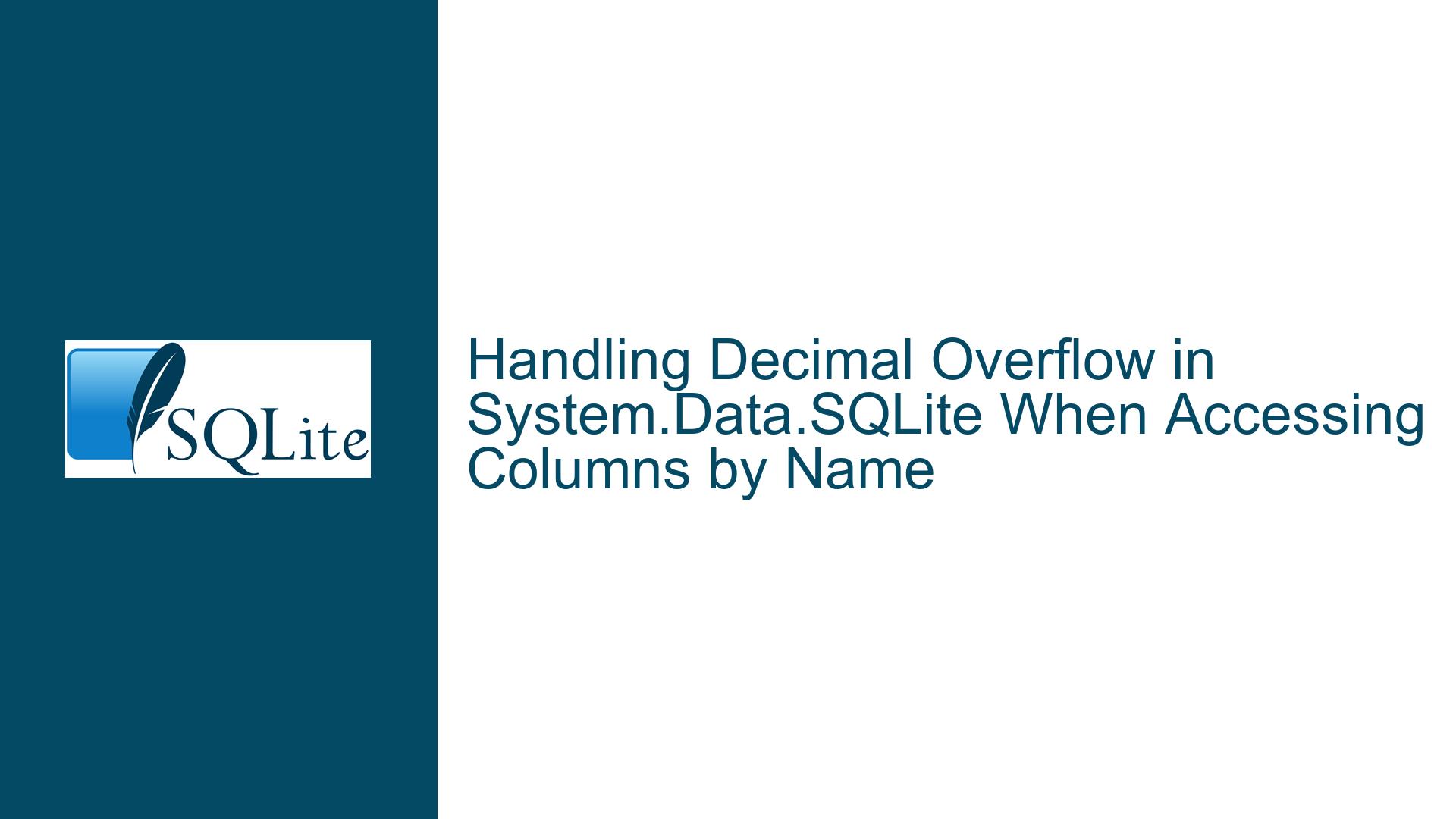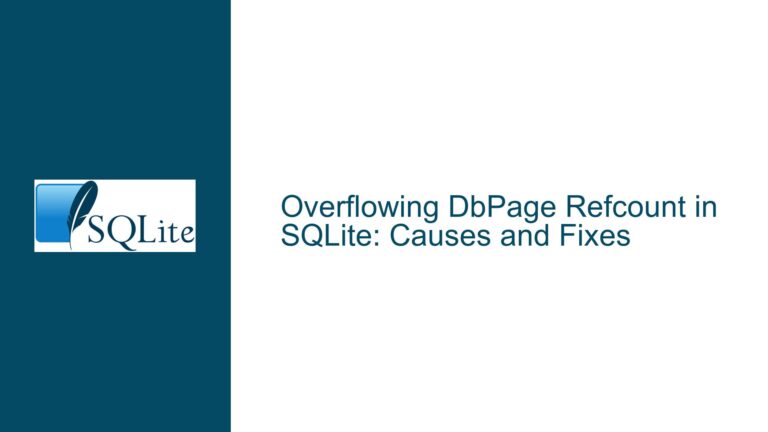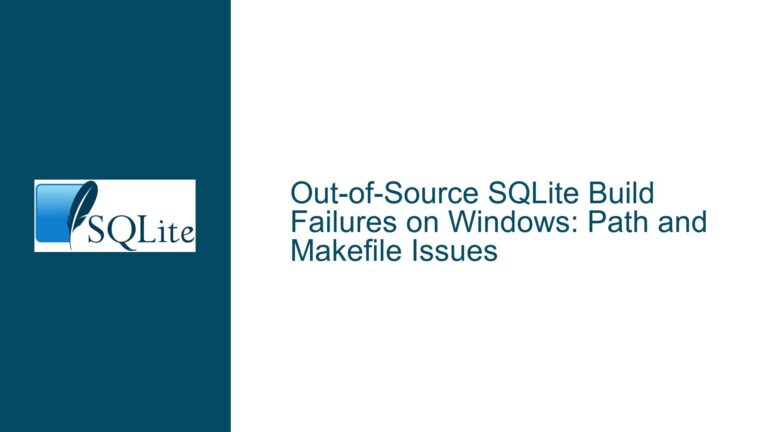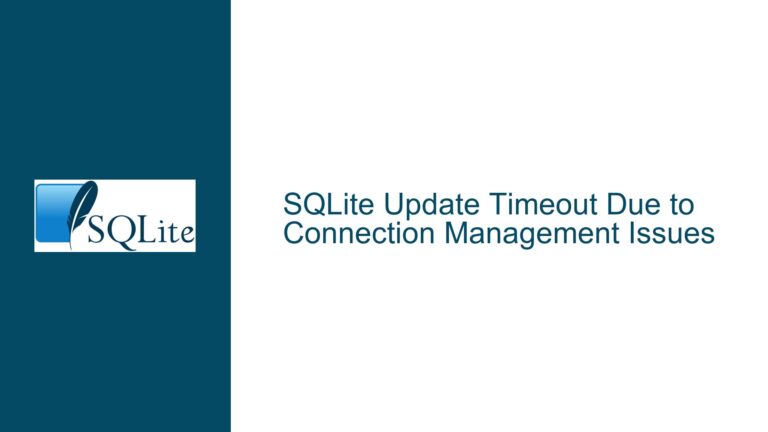Handling Decimal Overflow in System.Data.SQLite When Accessing Columns by Name
Mismatch Between Column Name and Ordinal Decimal Retrieval in C# and SQLite
Data Type Conversion Discrepancies in SQLiteDataReader
When working with System.Data.SQLite in .NET applications, developers may encounter a critical inconsistency when retrieving DECIMAL values from a SQLite database. The problem manifests as follows:
- Accessing a column by ordinal (e.g.,
reader.GetDecimal(4)) works without errors. - Accessing the same column by name (e.g.,
reader["Value"]) throws aSystem.OverflowExceptionwith the message "Value was either too large or too small for a Decimal."
This discrepancy arises due to differences in how the SQLiteDataReader handles type conversion internally when using column names versus ordinals. The root cause lies in SQLite’s type affinity system, the .NET runtime’s type conversion logic, and the specifics of the System.Data.SQLite provider implementation.
Key Observations from the Exception Stack Trace:
- The error occurs during a conversion from
System.DoubletoSystem.DecimalusingConvert.ToDecimal. - The
SQLiteDataReader’s indexer (reader["Value"]) internally callsGetValue, which attempts to convert the stored value to a.NETtype. - When using
GetDecimal, the provider bypasses intermediate conversions and directly maps the SQLite value to aDecimal.
This inconsistency suggests that the column’s stored value is being interpreted as a Double (64-bit floating-point) when accessed by name, but as a Decimal when accessed by ordinal. SQLite’s type affinity rules and the provider’s type resolution logic are central to this issue.
SQLite Type Affinity and .NET Provider Mismatches
1. SQLite’s Dynamic Typing and Type Affinity
SQLite does not enforce strict data types for columns. Instead, it uses type affinity to guide how values are stored and retrieved. For example:
- A column declared as
DECIMAL(or other numeric aliases likeNUMERIC) has aNUMERICaffinity. - A column declared as
REALor with no explicit type may store values asDouble.
If a value is inserted into a NUMERIC-affinity column using a floating-point literal (e.g., 123.456), SQLite may store it as a Double internally. This becomes problematic when the .NET provider attempts to map it to a Decimal using Convert.ToDecimal, which cannot safely handle all Double values due to differences in precision and range.
2. Provider-Specific Type Resolution
The System.Data.SQLite provider uses a two-step process to resolve data types:
- SQLite-to-.NET Type Mapping: The provider infers the .NET type based on the column’s declared affinity and the stored value’s type.
- Implicit Conversions: When using the indexer (
reader["Value"]), the provider returns aSystem.Object, which requires explicit or implicit conversion to the target type (e.g.,Decimal).
If the provider misclassifies a column’s stored value as Double instead of Decimal, using reader["Value"] will trigger an unsafe conversion from Double to Decimal, leading to OverflowException for values outside the valid range of Decimal (e.g., extremely large or small numbers).
3. Mono Runtime and ARMv7 Platform Considerations
The exception stack trace references the Mono runtime (<1030e815d9104f2a8a218067776e8f42>) on an ARMv7 architecture. Differences in floating-point handling between Mono and .NET Framework (e.g., precision, rounding) can exacerbate conversion errors, especially when dealing with edge-case values.
Resolving Type Mismatches and Ensuring Safe Decimal Conversions
Step 1: Validate Column Affinity and Stored Data Types
First, inspect the schema of the problematic table to verify the column’s declared type affinity:
PRAGMA table_info(YourTableName);
Look for the Value column’s declared type. If it uses REAL or a non-decimal type affinity, alter the schema to enforce NUMERIC affinity:
ALTER TABLE YourTableName RENAME TO TempOldTable;
CREATE TABLE YourTableName (
-- Other columns
Value NUMERIC -- Explicit NUMERIC affinity
);
INSERT INTO YourTableName SELECT * FROM TempOldTable;
DROP TABLE TempOldTable;
Step 2: Use Explicit Typed Accessors
Avoid relying on the indexer (reader["Value"]) for decimal values. Instead, use GetDecimal with the column’s ordinal position:
int valueOrdinal = reader.GetOrdinal("Value");
decimal value = reader.GetDecimal(valueOrdinal);
If column ordinals are unstable, resolve them dynamically:
string columnName = "Value";
int ordinal = reader.GetOrdinal(columnName);
decimal value = reader.GetDecimal(ordinal);
Step 3: Override Type Resolution with Casts in SQL Queries
Modify the SQL query to explicitly cast the column to a TEXT representation of the decimal, which forces the provider to parse it as a string and convert it safely:
SELECT CAST(Value AS TEXT) AS Value FROM YourTableName;
In C#, parse the string manually:
string valueText = reader.GetString(reader.GetOrdinal("Value"));
decimal value = decimal.Parse(valueText);
Step 4: Configure the SQLite Connection for Decimal Parsing
Set the BinaryGUID connection string parameter to False and explicitly declare the Value column’s type to guide the provider’s type resolution:
using (var conn = new SQLiteConnection("Data Source=your.db;BinaryGUID=False"))
{
conn.Open();
// Execute queries
}
Step 5: Handle Edge Cases with Custom Type Handlers
For advanced scenarios, implement a custom SQLiteFunction to convert values during retrieval:
[SQLiteFunction(Name = "ToDecimal", Arguments = 1, FuncType = FunctionType.Scalar)]
public class ToDecimalFunction : SQLiteFunction
{
public override object Invoke(object[] args)
{
if (decimal.TryParse(args[0].ToString(), out decimal result))
return result;
return DBNull.Value;
}
}
Register the function and use it in queries:
SELECT ToDecimal(Value) AS Value FROM YourTableName;
Step 6: Validate Floating-Point Precision in Mono
If the issue persists on Mono/ARMv7, test whether the runtime’s Double-to-Decimal conversion logic is faulty. Run a minimal reproducer:
double problematicValue = /* Value from database */;
try
{
decimal converted = (decimal)problematicValue;
}
catch (OverflowException ex)
{
// Log or handle the error
}
If this fails, consider rounding or truncating the value before conversion:
double rawValue = (double)reader["Value"];
decimal safeValue = (decimal)Math.Round(rawValue, 10); // Adjust precision as needed
Step 7: Update or Fork System.Data.SQLite
Check for updates to the System.Data.SQLite library, as newer versions may resolve type conversion bugs. If no fix exists, fork the library and modify the SQLite3.GetValue method to prioritize Decimal conversion for numeric columns:
// Hypothetical patch in SQLite3.cs
if (type == SQLiteType.Float && columnAffinity == COLUMN_NUMERIC)
{
return SQLiteConvert.ToDecimal(GetDouble(stmt, index));
}
By addressing SQLite’s type affinity rules, enforcing explicit conversions, and accounting for runtime-specific behaviors, developers can resolve the OverflowException and ensure consistent decimal handling across ordinal and column-name accessors.






